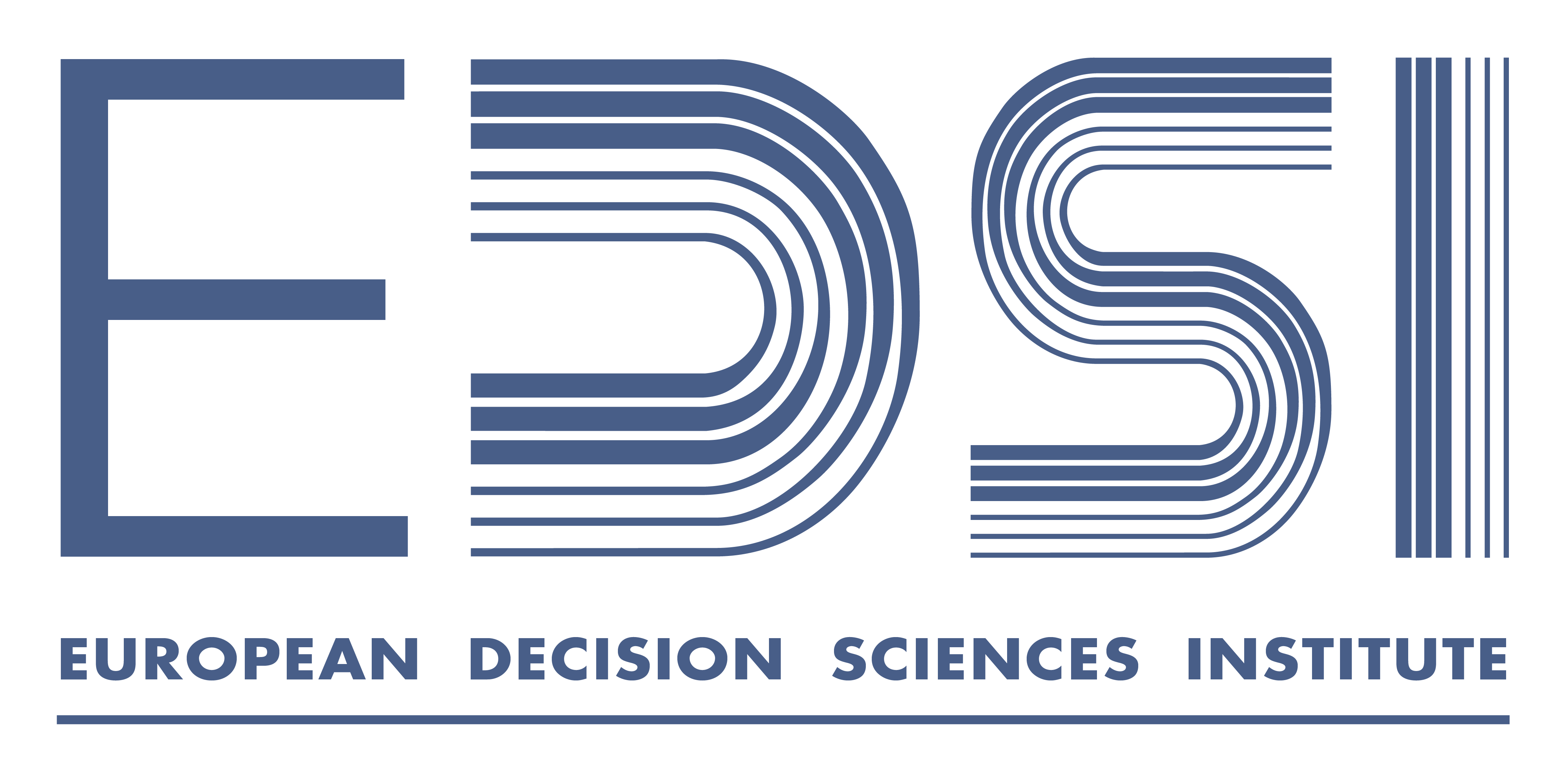Programme & Abstracts/Papers
Full Programme, Keynote Speakers, Book of Abstracts and Papers.
Day 1: 29th May
Registration
Doctoral Poster Session
EDSI Conference Welcome, Drinks and Dinner
Day 2 – 30th May
Registration
Keynote
Parallel Sessions
Business Keynote 1
Parallel Sessions
Gala Dinner
Day 3 – 31st May
Registration
Parallel Sessions
Business Keynote 2
Parallel Sessions
Evening – Sponsored Dublin City Centre Dinner (TBC)
Cultural Trips – 1st June
Morning – Walking Tour of Dublin
Tickets to be booked through the EDSI exOrdo dashboard.
Afternoon – For all your tourist needs: https://www.visitdublin.com/
Top rated attractions:
Guinness Storehouse
Trinity College – Book of Kells
EPIC Museum
Croke Park GAA museum
GPO museum
Organising Committee
Conference Chair
Prof PJ Byrne (Dublin City University)
Local Organising Committee
Dr James Byrne (Dublin City University)
Dr Paul Davis (Dublin City University)
Dr Colum Foley (Dublin City University)
Billy Schofield (Dublin City University)
Prof S Armagan Tarim (University College Cork)
Keynote Speakers
Machine Learning Driven Enhanced Planning and Decision Making
Damon Reid
Zoetis Inc., Dublin, Ireland

Driving down working capital through more advanced modelling, creates a resilience to the ever-changing Global Supply Chain, more efficient Product Development Pipelines and the Risk of Obsolescence. These not only free up significant cash for investment they also insulate the company from adverse economic events. Machine Learning and it’s careful application leverages robust statistical analysis to better model, predict and even recommend solutions for businesses.
About Damon Reid:
Damon is a Senior Director in Pharmaceutical Supply Chain with 18 years’ experience spanning both FMCG and Pharmaceutical sectors. He is currently responsible for the development of and the execution of Strategic International Business Integration programs. Having worked on Supply Chain, Operational and Continuous Improvement Transformation Programs, he is currently pursuing the applications of Machine Learning to the evolution of human driven decisions to automated, decision making technologies.
The ART of Decision Making
Joan Mulvihill
Digitalisation Lead, Siemens

“Computers are useless. They only tell us the answers” – Pablo Picasso. A decision is an answer to a question. In our increasingly digitalised and data driven world it is easy to relinquish or abdicate more and more of our decisions to the objectivity of the machine. But how objective is the machine and how limited are decisions that are based purely on data? The quality of the question is critical and it is limited by our capacity to imagine multiple options to choose from. How can we cultivate the art of decision making for a world relying on the imagination and courage for wicked problem solving?
About Joan Mulvihill:
As the Digitalisation Lead for Siemens in Ireland, Joan Mulvihill continues to be at the forefront of driving technology adoption in Ireland. Having held the position of CEO of the Irish Internet Association for 7 years, followed by 2 years as the Centre Director for the Irish Centre for Cloud Computing and Commerce, her role at Siemens builds on Siemens’ and her deep commitment to and understanding of the needs of Irish business for their digital transformation. Digitalisation means working differently. Siemens will always work with their clients to meet their operational technology needs with world class products and services and now through Digitalisation, Siemens leverages its domain expertise with clients to transform and create the businesses of their future.
Mapping the Supply Chain – Why and How?
Professor Bart L. MacCarthy
University of Nottingham, Business School, UK



Much has changed since the pandemic, not least the appreciation of the fragility of the global economy, and the critical role played by supply chains. Conventional supply chain practice has focused on the effective management of the first tier of supply by OEMs and large prime and focal organizations, as per the dominant Toyota supplier management model. With notable exceptions, much of our supply chain management research literature has shied away from describing, mapping, or appreciating the depth and complexity of the networks that deliver products and services. No longer – traceability, visibility, transparency, and security of supply are dominant concerns for organisations, governments, policy makers, and consumers. Supply chain regulation is on the rise with far more emphasis on rules of origin. As consumers, we seek assurances on the provenance of the products we purchase and the sustainability of their production and distribution. But such assurances require detailed supply chain knowledge. How knowable are supply chains? We will highlight the supply chain discovery challenge. We discuss the range of tools at our disposable to capture, map and analyse complex supply networks with examples including basic commodities, consumer and industrial products.
About Bart L. MacCarthy:
Professor MacCarthy is a full Professor of Operations Management at Nottingham University Business School. He teaches at Executive, MBA, and Masters levels in operations, supply chain, and project management. He is European Editor for the International Journal of Production Economics, which has strong citation metrics (Impact Factor 7.855, Citescore 12.2) and a Consulting Editor for the International Journal of Operations and Production Management (Impact Factor 6.629, Citescore 10.7). He is Vice-President and Board Member of the Decision Sciences Institute (2020-2022) with responsibilities for Europe. He is a Fellow of the Institute of Mathematics and its Applications, the Institution of Engineering and Technology, and the Chartered Institute of Logistics and Transport.
Bart’s research spans the analysis, modelling and management of operational systems in a wide range of sectors, employing both qualitative and quantitative methodologies. He is particularly interested in research that combines the analysis of practice and modelling. He has researched and consulted with a range of companies in automotive, aerospace, engineering, textiles and clothing, consumer products, food, logistics and retail sectors. Bart has published widely in the Operations, Supply Chain, and Management Science literatures and delivered keynote addresses on a number of Supply Chain and Operations Management topics. His current research interests include how supply chains evolve, and the impact of digitalization, cloud technologies, and platforms on the design, configuration and management of operational systems and supply chains. “The Digital Supply Chain – Technologies, Systems, Platforms, and Models, (Editors, Bart MacCarthy and Dmitry Ivanov)” will be published by Elsevier in the first half of 2022.
